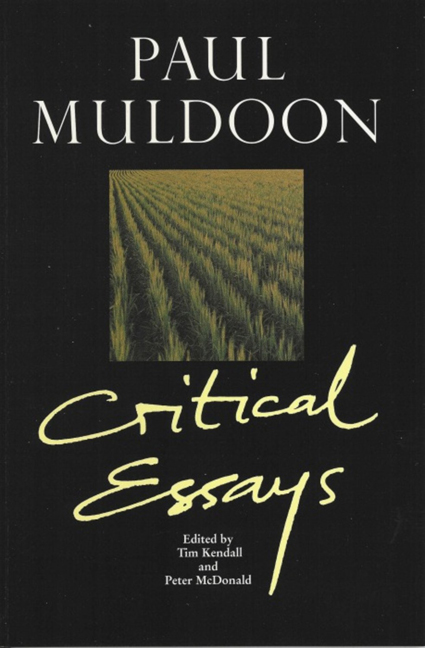Book contents
- Frontmatter
- Contents
- Acknowledgements
- Notes on Contributors
- Introduction
- ‘Thirteen or Fourteen’: Paul Muldoon's Poetics of Adolescence
- Never Quite Showing his Hand: Robert Frost and Paul Muldoon
- For Father Read Mother: Muldoon's Antecedents
- Pax Hibernica/Pax Americana: Rhyme and Reconciliation in Muldoon
- Muldoon and Pragmatism
- ‘All That’: Muldoon and the Vanity of Interpretation
- Paul Muldoon's Transits: Muddling Through after Madoc
- ‘All Art is a Collaboration’: Paul Muldoon as Librettist
- Muldoon's Remains
- Index
Introduction
- Frontmatter
- Contents
- Acknowledgements
- Notes on Contributors
- Introduction
- ‘Thirteen or Fourteen’: Paul Muldoon's Poetics of Adolescence
- Never Quite Showing his Hand: Robert Frost and Paul Muldoon
- For Father Read Mother: Muldoon's Antecedents
- Pax Hibernica/Pax Americana: Rhyme and Reconciliation in Muldoon
- Muldoon and Pragmatism
- ‘All That’: Muldoon and the Vanity of Interpretation
- Paul Muldoon's Transits: Muddling Through after Madoc
- ‘All Art is a Collaboration’: Paul Muldoon as Librettist
- Muldoon's Remains
- Index
Summary
‘So, what can I tell you?’ Paul Muldoon's question, in ‘Getting Round’, his Bateson lecture of 1998, is open to more than one tonal interpretation. Even so, there is somewhere in the many possible tones of this one particular address a serious question – serious, whether or not Muldoon is asking it in earnest. What can a poem ‘tell’ us, and how, for that matter, can we best tell what we have been told? Is what a poem ‘tells’ us finally – and unparaphrasably – only itself? And in that case, how far can a maker of poems tell us anything new, over and above the evidence of the pieces he or she has created?
Serious questions like these have elicited serious answers over time, and they confront anyone who tries, as a reader or even as a critic, to assemble a poet from the mass of poems and other writing that he or she puts about in the world. In Muldoon's case, the poet we have put together is already one of much complexity, a prolific producer of texts – poetic and otherwise – whose increasing critical celebrity in the 1990s and after has left him a highly visible, if in some respects still a slightly perplexing presence in the literary landscapes of Ireland, Britain and America. Like any successful contemporary poet, Muldoon publishes increasingly in a context of close academic attention: scholarship (as the present book, of course, itself attests) is watching him, while he, inevitably perhaps, is watching the scholars.
In some ways, Muldoon has a great deal to tell his observers, both about himself and his work; and it follows that, from time to time, the poet is speaking their language. Of all supposedly ‘difficult’ poets presently writing, Muldoon is surely among the most critically obliging. Yet this is only part of the story, and Muldoon has in fact been far from a mere caterer for academic wish-lists. Both his poetry and his prose have often kept their distance from the kinds of certainty – whether about personal or literary history, aesthetic or political positioning – which many students of contemporary writing would like to possess. Muldoon drops hints, makes suggestions, and hazards guesses about such things; but this is characteristically done with reservations, and a persistent air of provisionality.
- Type
- Chapter
- Information
- Paul MuldoonCritical Essays, pp. 1 - 5Publisher: Liverpool University PressPrint publication year: 2004



